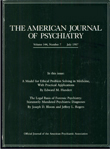Posttraumatic stress disorder: the etiologic specificity of wartime stressors
Abstract
The authors examined the effects of wartime stressors in a sample of 69 Vietnam veterans who were psychiatric inpatients in a Veterans Administration hospital. Participation in atrocities and the cumulative exposure to combat stressors, each independently of the other, conferred a significant risk for posttraumatic stress disorder. In contrast, the effect of these war experiences on the onset of panic, major depression, and mania was not significant. The results indicate that extreme stressors are uniquely linked with posttraumatic stress disorder's characteristic cluster of symptoms but challenge DSM-III's implicit assumption that the reexperienced trauma is the stressor responsible for posttraumatic stress disorder.
Access content
To read the fulltext, please use one of the options below to sign in or purchase access.- Personal login
- Institutional Login
- Sign in via OpenAthens
- Register for access
-
Please login/register if you wish to pair your device and check access availability.
Not a subscriber?
PsychiatryOnline subscription options offer access to the DSM-5 library, books, journals, CME, and patient resources. This all-in-one virtual library provides psychiatrists and mental health professionals with key resources for diagnosis, treatment, research, and professional development.
Need more help? PsychiatryOnline Customer Service may be reached by emailing [email protected] or by calling 800-368-5777 (in the U.S.) or 703-907-7322 (outside the U.S.).



